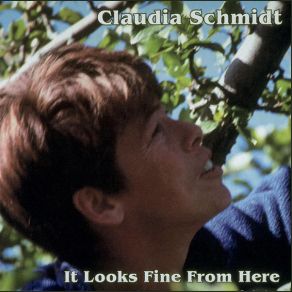It Looks Fine from Here
Download links and information about It Looks Fine from Here by Claudia Schmidt. This album was released in 1994 and it belongs to Songwriter/Lyricist, Contemporary Folk genres. It contains 12 tracks with total duration of 42:26 minutes.

|
|
|---|---|
| Artist: | Claudia Schmidt |
| Release date: | 1994 |
| Genre: | Songwriter/Lyricist, Contemporary Folk |
| Tracks: | 12 |
| Duration: | 42:26 |
| Buy it NOW at: | |
| Buy on iTunes $9.99 | |
Tracks
[Edit]| No. | Title | Length |
|---|---|---|
| 1. | Banana Moon | 4:12 |
| 2. | We Don't Know | 3:52 |
| 3. | Mowin' At Owen's | 3:48 |
| 4. | Another Kind | 3:34 |
| 5. | Postcard from Andrea | 3:09 |
| 6. | Miss Eulalia Thomas | 3:01 |
| 7. | Waltzing At the 45th Parallel | 2:49 |
| 8. | Winter Love | 3:09 |
| 9. | These Stars | 3:54 |
| 10. | Quiet Hills | 3:21 |
| 11. | You Can't Stop | 3:14 |
| 12. | Rising | 4:23 |
Details
[Edit]Claudia Schmidt adopts a stripped down approach on It Looks Fine from Here, playing either 12-string guitar or mountain dulcimer with only second guitarist Dean Magraw and percussionist Marc Anderson for accompaniment. When she sticks to the dulcimer, strumming vigorously, for example on "Banana Moon" and "Another Kind," she creates a sound distinctly reminiscent of Joni Mitchell's Blue. On the 12 original compositions (two of which, "Mowin' at Owen's" and "Waltzing at the 45th Parallel," are instrumentals), she writes of love and death, most often employing imagery borrowed from nature, particularly astronomy (e.g., "Banana Moon," "These Stars"). The subject of romance seems to bring out her densest lyrics, notably "Another Kind," in which the somewhat abstract terms parallel the tentative nature of the relationship being described. Schmidt is more direct and specific, by contrast, when speculating about the life of "Miss Eulalia Thomas," whose photograph she saw at the Ladies' Literary Club in Grand Rapids, MI, noting that Thomas is the only one apparently unmarried and observing, "All the others smile straight on/You come at me carefully...dreams in your eyes/Never quite caught, your chin so strong." Schmidt manages to take inspiration from the mysterious photograph, just as she does from the "Banana Moon," and though she complains, as much of herself as of society in general, that "We don't know what to do with what we've got" ("We Don't Know"), she concludes, "You can't stop my song" ("You Can't Stop").